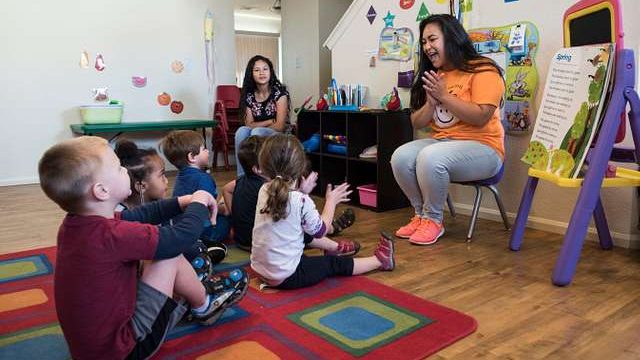Created Equal: The difficulties of paying (and getting paid) for child care in the US
David Leins September 26, 2024Wanzi Muruvi and Laura Herberg join “Created Equal” to find out why child care is so expensive, and child care workers are paid so little.

The cost of child care is an enormous financial burden for parents and guardians of young children in the United States — especially low-income households.
Subscribe to Created Equal on Apple Podcasts, Spotify, Google Podcasts, NPR.org or wherever you get your podcasts.
According to reporting from Outlier Media’s Laura Herberg, the cost of child care in Detroit is much higher than the federal government’s definition of affordable care, 7% of median income. In Detroit, the average cost of care is closer to 20-30% of median household income.
Paradoxically, that high price tag doesn’t translate to high wages for early child care education workers. In fact, child care workers are in the bottom percentiles of salaries for careers in the U.S., according to a report from Berkeley’s Center for the Study of Child Care Employment.
That same report finds that the younger the children an educator is responsible for, the lower the pay. There are also racial pay gaps, with Black and Latina early educators making less than their counterparts as well.
The child care worker crisis came into sharp focus during the pandemic, exposing a problem that was temporarily assuaged thanks to the American Rescue Plan Act of 2021. That windfall, however, is drying up, leaving parents, legislators and educators wondering what’s next for the unaffordable child care system in the U.S.
Herberg joined Created Equal on Wednesday along with Wanzi Muruvi of Berkeley’s Center for the Study of Child Care Employment to discuss these issues.
Guests:
- Wanzi Muruvi is a Senior Research and Policy Associate at Berkeley’s Center for the Study of Child Care Employment.
- Laura Herberg is a civic life reporter for Outlier Media.
Listen to Created Equal with host Stephen Henderson weekdays from 9-10 a.m. ET on Detroit Public Radio 101.9 WDET and streaming on-demand.
Trusted, accurate, up-to-date.
WDET strives to make our journalism accessible to everyone. As a public media institution, we maintain our journalistic integrity through independent support from readers like you. If you value WDET as your source of news, music and conversation, please make a gift today.
Author
-
 David Leins is the senior producer of WDET’s daily news and culture program, The Metro. He has produced several award-winning podcasts and multimedia series at WDET including Tracked and Traced, Science of Grief and COVID Diaries, which earned a National Edward R. Murrow Award for Excellence in Innovation. He previously led WDET’s StoryMakers program. David has an M.A. in Media Arts and Studies from Wayne State University, and a B.A. in anthropology from Grand Valley State University with a minor in Arabic. David teaches podcasting at Wayne State University and is an alumnus of the Transom Audio Storytelling Workshop.
David Leins is the senior producer of WDET’s daily news and culture program, The Metro. He has produced several award-winning podcasts and multimedia series at WDET including Tracked and Traced, Science of Grief and COVID Diaries, which earned a National Edward R. Murrow Award for Excellence in Innovation. He previously led WDET’s StoryMakers program. David has an M.A. in Media Arts and Studies from Wayne State University, and a B.A. in anthropology from Grand Valley State University with a minor in Arabic. David teaches podcasting at Wayne State University and is an alumnus of the Transom Audio Storytelling Workshop.
